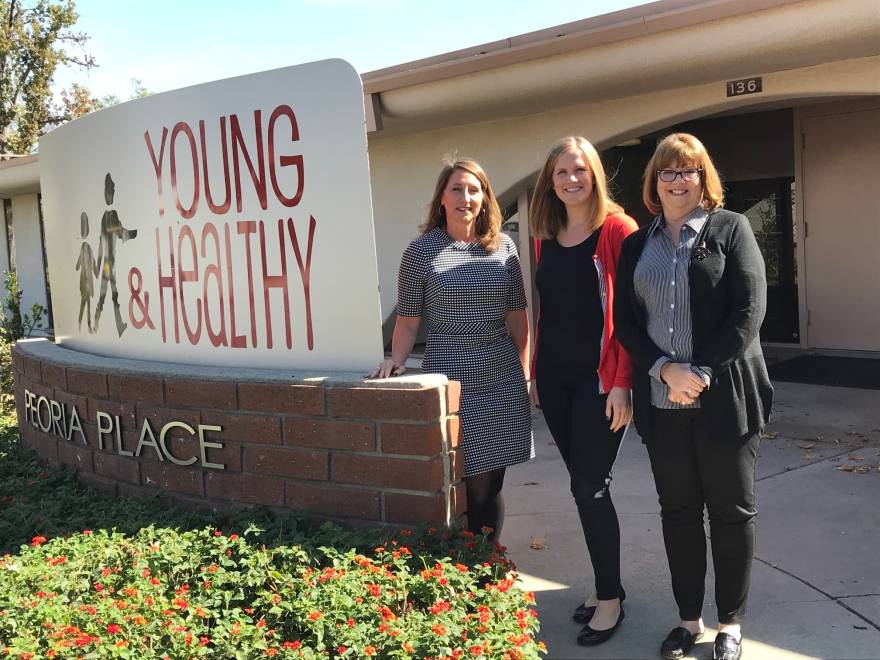

From left, Liz Arnold, program coordinator, education and volunteers; Whitney Harrison, program director; and Mary Donnelly-Crocker, executive director, at Young and Healthy in Pasadena, California.
Easing the Effects of Childhood Trauma
Like adults, children get stressed. But when children experience severe or prolonged adversity such as physical abuse or extreme poverty, the impact can damage their developing brains and harm their lifelong health and well-being.
Young and Healthy, a nonprofit that assists under-resourced children and families in Pasadena through prevention, education, and enhanced health care services, is working to help reduce the toll of toxic stress. The organization will pilot a trauma-informed school model in the Pasadena Unified School District (PUSD) in which administrators, teachers, staff, and parents are prepared to recognize, and respond to, those impacted by traumatic stress. In addition, students are provided with clear expectations and communication strategies to successfully guide them through stressful situations. The goal is not only to provide tools to cope with extreme situations, but also to create an underlying culture of respect and support.
“Relationship is key to the trauma-informed approach – having an adult who truly listens and finds a way to connect with that child can make all the difference.”
-- Julianne Reynoso, assistant superintendent of elementary education, Pasadena Unified School District
“Research indicates that the single most important aspect of healing the hurt of trauma in children is a positive, nurturing relationship with an adult,” said Mary Donnelly-Crocker, executive director, Young and Healthy. “Young and Healthy is committed to creating a healthy community by educating children, parents, and educators on how to become more aware of, and sensitive to, those who have suffered trauma. In turn, Pasadena can become a trauma-informed community.”
An estimated one-third of the children living in greater Pasadena need the type of services Young and Healthy offers. Kaiser Permanente Southern California has partnered with the organization for more than 20 years on community health grants to help children and families access needed medical and dental care. More recently, Young and Healthy has expanded its focus to include addressing environmental, social, and emotional factors that influence health. This past fall, Kaiser Permanente funded a $95,000, one-year grant to support Young and Healthy’s pilot program to launch the trauma-informed model within 10 Pasadena Unified School District campuses.
“This valuable project led by Young and Healthy will help reduce mental health stigma and build resilience in individuals, organizations, and the community,” said Sandra Silva, director, community health, Kaiser Permanente Southern California. “By understanding and responding to trauma, school administrators, teachers, and staff can help reduce its damaging impact, support critical learning, and create a more positive school environment.”
Long-term impact of childhood trauma
The landmark Centers for Disease Control and Kaiser Permanente Adverse Childhood Experiences (ACEs) Study demonstrated the link between childhood trauma and the increased risk for chronic disease as an adult, as well as emotional and social difficulties.
Inspired by the ACEs Study, Young and Healthy has been working to decrease the effects of trauma. Efforts have ranged from collaborating with community partners to convene a Pasadena Trauma-Informed Care Initiative and conducting trauma-informed training for various organizations, to providing a mindfulness curriculum for young PUSD students. Creating and implementing a trauma-informed school model became a natural next step. The pilot program will include:
- Providing training and technical assistance to leadership teams representing the participating schools to create and implement site-specific plans.
- Developing a comprehensive report with project results, evaluation, and recommendations as a tool for other PUSD schools to implement the model.
- Formalizing a Trauma-Informed Care Committee to establish standards to identify as trauma-responsive agencies. The committee includes representatives from PUSD, City of Pasadena Public Health Department, Huntington Hospital, Head Start Pasadena, Pasadena Office of the Young Child, and other community organizations.
“We are grateful for Kaiser Permanente’s partnership,” Donnelly-Crocker said. “They helped provide the seed money to start and continue our trauma-informed work that will help transform how our community recognizes and responds to people who have experienced trauma – ultimately improving the community’s health and well-being.”
Matthew Bennett, MBA, MA, a speaker, trainer, and author of “Connecting Paradigms,” shares more on how the Centers for Disease Control and Kaiser Permanente Adverse Childhood Experiences Study helped shape the trauma-informed approach. Bennett has been working with Young and Healthy and the Pasadena Unified School District to help implement the trauma-informed school model.
To learn more about Kaiser Permanente Southern California’s work in the community, visit http://community.kp.org.